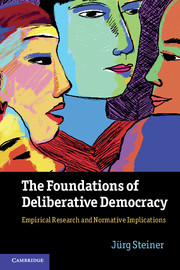Book contents
- Frontmatter
- Contents
- Figures
- Acknowledgments
- Introduction
- 1 Citizen participation in deliberation
- 2 Rationality and stories in deliberative justification
- 3 Common good and self-interest in deliberative justification
- 4 Respect in deliberation
- 5 Public openness of deliberation
- 6 Force of better argument in deliberation
- 7 Truthfulness in deliberation
- 8 Deliberation in the media and the Internet
- 9 Favorable conditions for deliberation
- 10 Favorable consequences of deliberation
- 11 The praxis of deliberation
- Appendix Newest version of Discourse Quality Index (DQI)
- Index
- References
7 - Truthfulness in deliberation
Published online by Cambridge University Press: 05 August 2012
- Frontmatter
- Contents
- Figures
- Acknowledgments
- Introduction
- 1 Citizen participation in deliberation
- 2 Rationality and stories in deliberative justification
- 3 Common good and self-interest in deliberative justification
- 4 Respect in deliberation
- 5 Public openness of deliberation
- 6 Force of better argument in deliberation
- 7 Truthfulness in deliberation
- 8 Deliberation in the media and the Internet
- 9 Favorable conditions for deliberation
- 10 Favorable consequences of deliberation
- 11 The praxis of deliberation
- Appendix Newest version of Discourse Quality Index (DQI)
- Index
- References
Summary
Normative controversies in the literature
In the Habermasian version of deliberative theory, truthfulness (Wahrhaftigkeit) is a key element. Other theorists, however, give less weight to truthfulness or, under certain conditions, even allow some “white lies.” In an early work, Jürgen Habermas postulates that “each person may only assert what he believes himself.” He sticks with this assertion in a more recent work where he writes that in deliberation participants must abstain from deceptive behavior (ohne Täuschung). Habermas claims that in most social situations it is routine praxis to assume that others are truthful; otherwise one would not engage in any conversation at all. If this assumption is violated, deliberation breaks down. For Habermas, without truthfulness no real deliberation can take place. For him, truthfulness is a necessary condition of deliberation in a constitutive sense. Habermas explicitly bases his theory on Immanuel Kant, so it is relevant to explore what Kant means by truthfulness. Like Habermas, Kant used the concept of Wahrhaftigkeit, which for him had a much deeper connotation than the English translation of truthfulness. The concept Wahrhaftigkeit for Kant certainly includes not telling lies, but it is much broader in its meaning. To be wahrhaftig means to be true to one’s inner self, to find one’s innermost identity. For Kant, to be wahrhaftig is to find one’s human dignity. He went as far as to write that not to be wahrhaftig is a crime because one destroys one’s human dignity. Without human dignity, we become mere “speech machines” (Sprachmaschinen). For Kant it is a duty (Pflicht) to oneself and to others to be wahrhaftig. If we are not wahrhaftig with others, we do not respect their human dignity, and we do not act according to our own dignity.
- Type
- Chapter
- Information
- The Foundations of Deliberative DemocracyEmpirical Research and Normative Implications, pp. 153 - 166Publisher: Cambridge University PressPrint publication year: 2012



